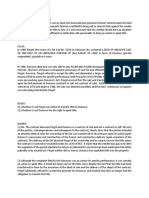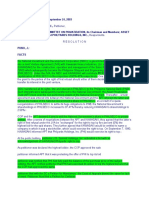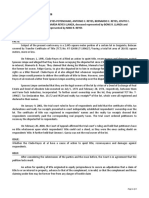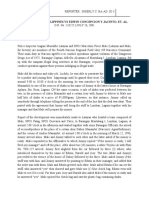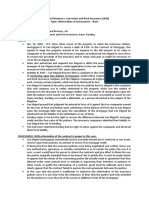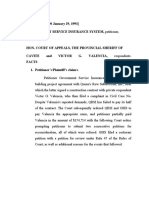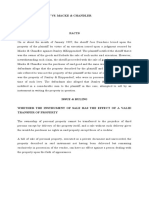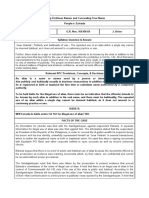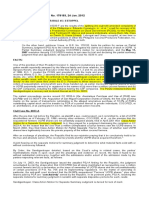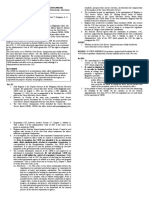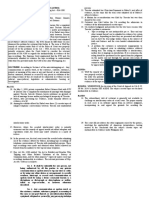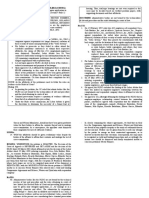0 ratings0% found this document useful (0 votes)
292 viewsYuchengco v. Sandiganbayan
Yuchengco v. Sandiganbayan
Uploaded by
Mina Aragon1. This case involves five petitions challenging decisions by the Sandiganbayan in a case filed by the Republic to recover alleged ill-gotten wealth of former President Marcos, including shares of stock in PTIC.
2. The Republic claimed the Marcoses owned "dummy corporations" including PHI, through which they owned shares of PTIC. The Sandiganbayan dismissed the Republic's case for lack of evidence.
3. The Supreme Court ruled the Sandiganbayan erred by not giving weight to testimonies establishing the Marcoses owned the dummy corporations. While evidence was disputed, the Republic presented a persuasive case under the preponderance standard to show Marcoses' ownership of PHI and corresponding PTIC
Copyright:
© All Rights Reserved
Available Formats
Download as PDF, TXT or read online from Scribd
Yuchengco v. Sandiganbayan
Yuchengco v. Sandiganbayan
Uploaded by
Mina Aragon0 ratings0% found this document useful (0 votes)
292 views5 pages1. This case involves five petitions challenging decisions by the Sandiganbayan in a case filed by the Republic to recover alleged ill-gotten wealth of former President Marcos, including shares of stock in PTIC.
2. The Republic claimed the Marcoses owned "dummy corporations" including PHI, through which they owned shares of PTIC. The Sandiganbayan dismissed the Republic's case for lack of evidence.
3. The Supreme Court ruled the Sandiganbayan erred by not giving weight to testimonies establishing the Marcoses owned the dummy corporations. While evidence was disputed, the Republic presented a persuasive case under the preponderance standard to show Marcoses' ownership of PHI and corresponding PTIC
Copyright
© © All Rights Reserved
Available Formats
PDF, TXT or read online from Scribd
Share this document
Did you find this document useful?
Is this content inappropriate?
1. This case involves five petitions challenging decisions by the Sandiganbayan in a case filed by the Republic to recover alleged ill-gotten wealth of former President Marcos, including shares of stock in PTIC.
2. The Republic claimed the Marcoses owned "dummy corporations" including PHI, through which they owned shares of PTIC. The Sandiganbayan dismissed the Republic's case for lack of evidence.
3. The Supreme Court ruled the Sandiganbayan erred by not giving weight to testimonies establishing the Marcoses owned the dummy corporations. While evidence was disputed, the Republic presented a persuasive case under the preponderance standard to show Marcoses' ownership of PHI and corresponding PTIC
Copyright:
© All Rights Reserved
Available Formats
Download as PDF, TXT or read online from Scribd
Download as pdf or txt
0 ratings0% found this document useful (0 votes)
292 views5 pagesYuchengco v. Sandiganbayan
Yuchengco v. Sandiganbayan
Uploaded by
Mina Aragon1. This case involves five petitions challenging decisions by the Sandiganbayan in a case filed by the Republic to recover alleged ill-gotten wealth of former President Marcos, including shares of stock in PTIC.
2. The Republic claimed the Marcoses owned "dummy corporations" including PHI, through which they owned shares of PTIC. The Sandiganbayan dismissed the Republic's case for lack of evidence.
3. The Supreme Court ruled the Sandiganbayan erred by not giving weight to testimonies establishing the Marcoses owned the dummy corporations. While evidence was disputed, the Republic presented a persuasive case under the preponderance standard to show Marcoses' ownership of PHI and corresponding PTIC
Copyright:
© All Rights Reserved
Available Formats
Download as PDF, TXT or read online from Scribd
Download as pdf or txt
You are on page 1of 5
002 YUCHENGCO vs. SANDIGANBAYAN (LAGUILLES) fatal to its cause.
Carpio-Morales, J. | Jan. 20, 2006 | Equipoise Rule
Dissenting opinion (equipoise rule):
PETITIONER: Alfonso T. Yuchengco and Y Realty Corporation, J. Sandoval-Gutierriez disagrees with the majority opinion in that the
Republic of the Philippines, Estate of Ferdinand E. Marcos Republic failed to prove that the blank deeds of assignment/trust ever
RESPONDENTS: Sandiganbayan turned up in Marcos’ hands because there was no proof of prior delivery to
the latter. In fact, the deeds were delivered to Ramon Cojuangco and not to
SUMMARY: This case involves five consolidated petitions that pray for Marcos, thus negating any involvement of Marcos in the alleged dummy
the nullification of certain issuances of the Sandiganbayan in the case of corporations. Moreover, on the assumption that the Republic has presented
Republic vs. Estate of Ferdinand Marcos. The case is for the recovery of a persuasive case, it may not be said that defendants do not have in their
alleged ill-gotten wealth of the Marcoses, among which are shares of stock favor an equally persuasive one. Even were we to find the balance of
of PTIC. The Sandiganbayan dismissed the petition of the Republic for evidence to be just about at equipoise, the Republic’s instant claim must
lack of merit. The Cojuangco and the Marcoses both agree that PHI has a fall. Equiponderance of evidence rule states that when the scales shall
beneficial owner, but the disagreement is as to who the beneficial owner is. stand upon an equipoise and there is nothing in the evidence which
The Republic’s theory is that the Marcoses own “dummy corporations” shall incline it to one side or the other, the court will find for the
organized by their cronies; in this case, it is the Republic’s witnesses defendant.
Campos, Gapud, and de Guzman. All three witnesses claimed that they Under the said principle, the plaintiff must rely on the strength of his
organize dummy corporations for the former President Marcos and as a evidence and not on the weaknesses of defendant’s claim.
standard operating procedure, they issue deeds of assignment in blank.
DOCTRINE: When the scales shall stand upon an equipoise and there is
The issue now is WoN the Sandiganbayan erred in failing to appreciate the nothing in the evidence which shall incline it to one side or the other, the
evidence presented by the Republic – YES. court will find for the defendant.
*Note: This case is under the Equipoise Rule in the syllabus, but that topic
The Court held that The testimonies of Campos, Gapud, and Atty. was only discussed in the dissenting opinion of J. Sandoval-Gutierrez.
Francisco establish the Marcoses’ ownership of PHI. Campos is a former Nevertheless, I will put a bit of the dissenting opinion in the summary box
Marcos crony who surrendered. He claimed that he assisted in the and put the equipoise rule as the doctrine. !
organization and acquisition of some business ventures for the president.
Gapud was the financial consultant who took over the direct responsibility FACTS:
of managing and administering all the activities of the said corporations. 1.! These are five consolidated petitions that pray for the nullification of
Campos also admitted his family’s involvement in UNILAB as original certain issuances of the Sandiganbayan in Republic vs. Estate of
stockholders. Finally, he said that all the corporations he organized was Ferdinand E. Marcos, et al (hereinafter referred to as “the case”).
surrendered directly to President Marcos, and such was standard policy. 2.! The case was filed before the Sandiganbayan by the Republic
These statements speak for themselves. However, the Sandiganbayan, after through the PCGG against former President Marcos and Mrs.
finding that “almost all the documents offered by the Republic are Marcos, their three children, and some other individuals.
photocopies” omitted any discussion of the evidentiary weight of the 3.! The case is for the recovery of alleged ill-gotten wealth of the
Republic’s testimonial evidence. In so ruling, the Sandiganbayan grossly Marcoses, among which are shares of stock in the Philippine
misappreciated the weight of evidence presented by the Republic. The Telecommunications Investment Corporation (PTIC): 79,779 shares
Sandiganbayan did not explain its reasons for holding that, in the name of Ramon Cojuangco; 21,525 shares in the name of
notwithstanding the existence of Gapud’s testimony in the records, there is Imelda Cojuangco; and 111,415 shares in the name of Prime
no competent evidence to support the Republic’s thesis. Lastly, the Holdings Incorporated. PTIC is the biggest stockholder of PLDT.
BASECO case did not make a pronouncement or evidentiary rule that the 4.! In the course of the proceedings of the case, the first three petitions
failure of the Republic to present as evidence blank deeds of assignment is assailing interlocutory orders of the Sandiganbayan were filed. The
first two petitions were filed by Alfonso Yuchengco and Y Realty 3.! PHI was registered with 5 incorporators. The total amount of capital
Corporation, assailing the resolutions of the Sandiganbayan denying stock subscribed was thus P200,000, P50,000 of which was actually
their motions to suspend trial pending discovery proceedings and to paid. The 5 PHI incorporators, in their capacity as stockholders,
re-set trial dates, and declaring them as having waived their right to elected themselves as directors.
present evidence. The third petition was filed by the Republic, 4.! Meanwhile, 54,349 shares in another corporation, PTIC, were
assailing the order of Sandiganbayan denying its motion for “contributed to and/or abandoned” by one of its stockholders,
additional time to complete the presentation of evidence. General Telephone and Electronics, an American corporation, in
5.! During the pendency of these first three petitions, the Sandiganbayan favor of PTIC.
continued with the proceedings with the case, no restraining order 5.! The PTIC Board of Directors resolved to sell such 54,349 shares to
having been issued by this Court. its stockholders in proportion to their holdings. No stockholder, apart
6.! The Sandiganbayan, still during the pendency of the first three from Cojuangco, PTIC President expressed interest in purchasing the
petitions, promulgated a partial decision, dismissing the complaint of shares. All the 54,349 shares were then transferred to his name.
the Republic for lack of merit and the complaint-in-intervention filed 6.! Cojuangco and Rivilla, another stockholder of PTIC, together with
by Yuchengco dismissed. PHI President Gapud, forged an agreement referring to the various
7.! The last two of the five petition at bar filed by Yuchengco and the discussions during which Cojuangco and Rivilla agreed to purchase
Republic both challenge the partial decision. The incidents then gave partially paid subscriptions and common shares of PTIC. The
rise to the filing of the petitions. agreement states that the number of PTIC shares which Cojuangco
ISSUE: and Rivilla were prepared to sell to PHI was “111,415 common
WoN the partial decision being assailed conforms to the evidence presented, shares representing 46.1250% of the subscribed and outstanding
the law and/or settled jurisprudence – NO, because the Sandiganbayan failed shares of PTIC.”
to give credence to the testimonies of Campos, Gapud, and de Guzman. 7.! PTIC granted Cojuangco and Rivilla authorization to transfer their
shares to PHI.
RULING: WHEREFORE, the petition of the Republic of the Philippines in Beneficial ownership of PHI
G.R. No. 153459 is GRANTED to the extent that it prays for the 8.! Respondents in GR No. 153459 agree with Republic that PHI has an
reconveyance to the Republic of 111,415 PTIC shares registered in the name undisclosed beneficial owner, their only disagreement being who the
of PHI. The petitions in G.R. Nos. 149802, 150320, 150367, and 153207 are owner is.
DENIED for lack of merit. Quantum of evidence
9.! EO No. 14-A clearly states that the degree of proof required in
RATIO: cases such as the one at bar is preponderance of evidence.
1.! There is no disagreement with respect to the disposition-dismissal by 10.! The Sandiganbayan, therefore, was not to look for proof beyond
the minority of the first three petitions – the first having become reasonable doubt, but to determine, based on the evidence
moot, and the second and third for lack of grave abuse of discretion presented, in light of common human experience, which of the
on the part of the Sandiganbayan. There is also no disagreement with theories proffered by the parties is more worthy of credence.
respect to the disposition-denial by the minority of the fourth petition 11.! In Joaquin v. Navarro, the Court held the juries must often reason,
in the absence of reversible error on the part the Sandiganbayan. according to probabilities, drawing an inference that the main fact in
2.! According to the Sandiganbayan, the Republic has failed to provide issue existed from collateral facts not directly proving, but strongly
such “proof of authenticity or reliability” of the documents offered tending to prove, its existence. The vital question in such cases is the
by it in evidence. Thus, almost all the documents offered by the cogency of the proof afforded by the secondary facts. How likely,
Republic are photocopies and no effort was undertaken to submit the according to experience, is the existence of the primary fact if certain
originals of said documents or to have them properly identified, or to secondary facts exist?
otherwise justify the admission of mere photocopies. 12.! The evidence presented by the parties shows that the preponderance
Factual background of PHI and its dealings with PTIC: clearly lies with the Republic, but the Sandiganbayan grossly
misappreciated it and, therefore, committed a reversible ereror. of deeds of assignment in blank.
13.! In Ramos Sr. vs. Gatchalian, the Court ruled that findings of facts of 21.! The only issue on which Campos showed a lack of certitude was
the CA are binding on the SC and will not be overturned when whether PHI actually held PTIC shares in its name. In any event,
supported by the evidence on record save in the known exceptions Campos’ lack of knowledge regarding PHI’s holdings in PTIC
such as gross misappreciation of the evidence or misapprehension of cannot be considered fatal to his credibility, since this lack of
facts. knowledge is fully accounted for by the extent of Campos’
14.! The testimonies of Campos, Gapud, and Atty. Francisco establish the participation in the transactions of PHI.
Marcoses’ ownership of PHI. Campos is a former Marcos crony who 22.! During cross-examination of Republic’s witness de Guzman shows
surrendered. He claimed that he assisted in the organization and that after Campos organized PHI, he entrusted most if not all of its
acquisition of some business ventures for the president. Gapud was business transactions to his close associate Gapud, the president of
the financial consultant who took over the direct responsibility of PHI who himself confessed to have acted as a Marcos nominee.
managing and administering all the activities of the said 23.! The Court has come to the conclusion that Campos’ deposition is
corporations. Campos also admitted his family’s involvement in worthy of credence. With regard to the statement of Campos that he
UNILAB as original stockholders. Finally, he said that all the never had any discussion or correspondence with Marcos regarding
corporations he organized was surrendered directly to President the latter’s beneficial ownership of PTIC and PHI, it must be noted
Marcos, and such was standard policy that the testimony of a witness must be considered and calibrated
15.! These statements speak for themselves. However, the in its entirety and not by truncated portions thereof or isolated
Sandiganbayan, after finding that “almost all the documents offered passages therein.
by the Republic are photocopies” omitted any discussion of the 24.! An examination of Campos’ statement in its proper context reveals
evidentiary weight of the Republic’s testimonial evidence. that, before he was asked if he ever had any discussions with Marcos
16.! In so ruling, the Sandiganbayan grossly misappreciated the weight of regarding his beneficial ownership in PTIC or PHI, there was a long
evidence presented by the Republic, reducing to naught Campos’ line of successive questions that all focused on the PTIC shares held
categorical statement that PHI is one of the corporations he by PHI.
organized in behalf of Marcos and that in all the corporations he 25.! Setting aside any preconception that Campos merely cut a deal with
organized – that was the standard policy – that we surrendered a the PCGG, it can be reasonably inferred that Campos merely
deed of trust or assignment direct to president Marcos. misapprehended the question posed to him and thought that it was
17.! The minority, however, attempts to supply what is lacking in the still referring only to PHI’s holdings in PTIC. Campos should not,
Sandiganbayan decision by citing grounds why this Court should not therefore, be understood as saying that he never talked to Marcos
give weight to the testimony of Campos. about PHI; rather, he was referring only to PTIC.
18.! While the minority acknowledges that it is a fact deducible from 26.! Gapud, one of the incorporators of PHI, affirmed Campos’ sworn
Campos’ sworn declarations that he adhered to a set of patterns or statement and his deposition taken in HK substantially corroborates
practices when he organized corporations for Marcos, it opines that the statements of Campos and further establishes that PHI was a
Mr. Campos was unable to declare with certitude if these patterns dummy corporation of the Marcoses.
and practices were followed vis-à-vis PHI. 27.! The Sandiganbayan did not explain its reasons for holding that,
19.! On the contrary, Campos plainly meant that the “patterns and notwithstanding the existence of Gapud’s testimony in the records,
practices” he mentioned were followed in all corporations organized there is no competent evidence to support the Republic’s thesis. The
on behalf of Marcos, including PHI. minority, however, thinks that Gapud contradicted himself with
20.! With regard to whether there truly exists certificates indorsed in respect to the disposition of his 400 shares in PHI since “it would
black or deed of trust or assignment in favor of an unnamed have been implausible for him to make the assignment to Mr.
beneficiary delivered to Marcos, Campos answered that PHI was one Cojuangco if the covering certificates had been delivered to
of the corporations that he organized for Marcos and that all such Marcos.”
corporations were subject to the same policy regarding the issuance 28.! This argument, however, misinterprets the statement of Gapud, since
he did not specifically state that covering certificates were delivered hands of Marcos or those of Cojuangco.
to Marcos, but only that shares of stock or assignments indorsed in 35.! The testimonies of Campos, Gapud, and de Guzman, persons who
blank were delivered to Marcos by Campos. actually participated in the formation and early years of operation of
29.! Moreover, Gapud was not being asked whether he knew anything PHI, constitute evidence that directly addresses the critical issue.
about PHI’s holding in PTIC but only whether he knew anything Indubitably, the preponderance of evidence lies with the Republic.
about PTIC itself as a corporation. Misapplication of Baseco vs. PCGG
30.! Lastly, the deposition of de Guzman clearly support the thesis of the 36.! Underlying the finding of the Sandiganbayan that the subject PHI
Republic that PHI is a dummy of the Marcoses, it having been shares are not part of the Marcos ill-gotten wealth is its reliance on
completely organized by associates of Campos, who had the supposed determinative indicia set out in Bataan Shipyard &
categorically testified to having organized PHI for the benefit of Engineering Co., Inc. (BASECO) vs. PCGG. The Sandiganbayan
Marcos. By affirming that PHI was organized by Campos, by interprets BASECO to have established the following evidentiary
identifying all the incorporators and himself as Campos’ associate, standards:
and by revealing that the office of PHI was within the premises of a.! One, evidence indicating manifest partiality and favorable
Campos – controlled by UNILAB, de Guzman substantially treatment by the former President have resulted in
corroborated the Campos and Gapud testimonies. inexplicable benefits to the trustees or to the corporations
Preponderance of evidence lies with the Republic held by him through such trustees; and
31.! The Republic’s thesis that President Marcos is the beneficial owner b.! Two, the existence of documents and records in the
of PHI is deduced from the established facts which, weighed by possession of the former president provide the legal
common experience, engender the inference as a very strong instrumentation for him to assert ownership or control over
probability. Only a Marcos ownership can make sense of the the properties held by his trustees and/or to recover such
circumstances surrounding the origins of PHI. properties from them.
32.! Only a Marcos ownership of PHI can plausibly account for the 37.! The foregoing statement is not a direct quote by the Sandiganbayan
substantially corroborated admissions of Campos and Gapud that from the ruling in BASECO, but the graft court’s inference from its
they organized PHI in behalf of Marcos. reading of the decision. Such inference is thus valid only to the
33.! On the basis of the evidence, therefore, President Marcos owned PHI extent that it was logically contemplated in the BASECO decision
and all the incorporators thereof acted under his direction. Once this itself.
is acknowledged, the following conclusions inevitably follow: 38.! A reading of BASECO would reveal that it did not intend to
a.! Cojuangco was elected President and took over the establish evidentiary norms for all future cases involving the Marcos
management of PHI in 1981 with the cooperation of the wealth. Nowhere does it state that the failure of the Republic to
Marcos nominees who still held the majority stockholding; present as evidence blank deeds of assignment is fatal to its cause.
b.! As the remaining incorporators on the board divested their J. Sandoval-Gutierrez, dissenting:
shares only in 1983, Cojuangco managed a Marcos- 39.! The Republic’s case is premised on the theory that PHI is a “dummy
controlled corporation for at least two years; corporation,” not owned by private respondent Cojuangco family,
c.! The simultaneous divestment of shares by the three but merely held in beneficial trust for former President Marcos.
remaining incorporators on the board to Cojuangco’s close 40.! Republic’s case is anchored almost entirely upon the testimonies of
relatives were with the knowledge and authorization of their Campos, Gapud, and de Guzman. The same witnesses identified the
principal – President Marcos. modus operandi employed by Marcos to hide his ill-gotten wealth.
34.! Clearly, all these circumstances mark out Cojuangco either as a Unfortunately, the evidence for the Republic fails to show that PHI is
nominee of Marcos as was Gapud or at the very least, a close Marcos’ dummy corporation.
associate of Marcos. As such, the PCGG can and must recover for 41.! In his affidavit, Campos named PHI as one of the companies he
the Republic the 111,415 PTIC shares being held by PHI, they organized for Marcos. Yet, when asked if the modus operandi was
bearing the character of ill-gotten wealth whether they be in the applied to PHI as it was with the other Marcos dummy corporations,
he said that it was a policy that they surrender it directly to Marcos. stand upon an equipoise and there is nothing in the evidence
42.! Also, Campos testified that he had never communicated in any many which shall incline it to one side or the other, the court will find
with Marcos. Considering the fact that Campos, by his own for the defendant.
admission, was the organizer of dummy corporations for Marcos, it 51.! Under the said principle, the plaintiff must rely on the strength of
is contrary to human experience that he never had any discussion his evidence and not on the weaknesses of defendant’s claim.
with Marcos about PHI. Obviously, there was nothing to discuss Even if the evidence of the plaintiff may be stronger than that of
with Marcos about PHI because it was not one of his dummy the defendant, there is no preponderance of evidence on his side
corporations. if such evidence is insufficient in itself to establish his cause of
43.! If, according to the Republic’s own witness, the shares of a Marcos action.
dummy corporation are covered by a deed of assignment endorsed to 52.! So must be it in this case. On the assumption that the Republic has
an unnamed beneficiary, then de Guzman’s admission are fatal to the presented a persuasive case, it may not be said that defendants do not
Republic’s case. His declaration is that the blank deeds of have in their favor an equally persuasive one. Even were we to find
assignment and deeds of trust covering PHI shares were not the balance of evidence to be just about at equipoise, the Republic’s
delivered to Marcos, but to Ramon Cojuangco. instant claim must fall.
44.! Considering that Marcos was not in possession of the deeds over PHI 53.! Some might argue that the evidentiary requirement in civil
shares, he could not have controlled or managed PHI. To be sure, forfeiture cases has an even higher standard, that is, proof
there was no point organizing PHI as a dummy corporation for beyond reasonable doubt. In Cabal vs. Kapunan, we ruled that
Marcos since he could not perform these functions. Gapud testified proceedings for forfeiture of property in favor of the State is criminal
that he assigned his PHI shares to Ramon Cojuangco, not Marcos. and penal in nature because such actions are primarily to punish for
45.! While Gapud could have easily identified Marcos as the beneficial violation of a duty or a public wrong. Forfeiture of property is in
owner of PHI, he refused under oath to do so. The ponencia sidesteps substance a criminal proceeding, and such forfeiture has been held to
the reality that there is no evidence of prior delivery to Marcos. partake of the nature of a penalty.
46.! The realistic scenario, therefore, is that these shares actually
pertained to Ramon Cojuangco from the beginning. In other words,
Cojuangco, not Marcos, has been the beneficial owner of the shares
from the start. This explains why no blank deeds of trust or
assignment were executed and delivered by the stockholders of PHI,
and the reason why they executed and delivered the deeds naming
Ramon Cojuangco as assignees.
47.! Moreover, the BASECO ruling is applicable. BASECO is a
landmark ruling that confirms the modus operandi described by the
Republic’s witnesses. In that case, “street certificate” and deeds of
assignment to various corporations including BASECO, also
assigned in blank, were among the documents found to have been in
Marcos’ possession in Malacanang.
48.! But unlike in BASECO, here there is no such documentary evidence.
Neither PHI stock certificates nor PHI deeds of assignment have
turned up in Marcos’ hands.
49.! Because this is a civil forfeiture case, then the Republic must
establish, by a “preponderance of evidence,” that the PHI shares
were ill-gotten wealth.
50.! Equiponderance of evidence rule states that when the scales shall
You might also like
- Degayo Vs Dinglasan-Res JudicataDocument10 pagesDegayo Vs Dinglasan-Res JudicataDanica Irish RevillaNo ratings yet
- Sandiganbayan Ruling On Ninoy AssassinationDocument184 pagesSandiganbayan Ruling On Ninoy AssassinationRaul A. ArcangelNo ratings yet
- Pantranco V NLRCDocument2 pagesPantranco V NLRCasdgafsdgadfg0% (1)
- Republic V Heirs of OribelloDocument3 pagesRepublic V Heirs of OribelloChristian CabreraNo ratings yet
- CivPro Case-Digest Cabrera-vs-Ng - Docx 1.odtDocument5 pagesCivPro Case-Digest Cabrera-vs-Ng - Docx 1.odtJevi RuiizNo ratings yet
- B Van Zuiden vs. GTVL ManufacturingDocument3 pagesB Van Zuiden vs. GTVL ManufacturingErwin DacanayNo ratings yet
- Consti Page 23-12 PhilConsa Vs GPH, GR 218406 (Nov. 29, 2016)Document9 pagesConsti Page 23-12 PhilConsa Vs GPH, GR 218406 (Nov. 29, 2016)Lu CasNo ratings yet
- Salazar v. CFIDocument2 pagesSalazar v. CFILouie BruanNo ratings yet
- Gr149802 Yuchengco Vs SandiganbayanDocument6 pagesGr149802 Yuchengco Vs SandiganbayanNikka Bianca Remulla-IcallaNo ratings yet
- Priscilla MijaresDocument2 pagesPriscilla MijaresbingNo ratings yet
- Midterm Cases EvidenceDocument309 pagesMidterm Cases EvidenceAiai Harder - GustiloNo ratings yet
- Digest - Francisco vs. MejiaDocument2 pagesDigest - Francisco vs. MejiaPaul Vincent Cunanan100% (3)
- 2018 Sioco - v. - People20180417 1159 1rkys4wDocument4 pages2018 Sioco - v. - People20180417 1159 1rkys4wPark Chael Reose Eonni0% (1)
- AZARRAGADocument2 pagesAZARRAGAlucky javellanaNo ratings yet
- 1A Group 1 To 6 Reporting Legal Techniques and LogicDocument36 pages1A Group 1 To 6 Reporting Legal Techniques and Logicemen penaNo ratings yet
- 91 Choco V SantamariaDocument4 pages91 Choco V SantamariaKrister VallenteNo ratings yet
- Rebadulla Vs RepublicDocument11 pagesRebadulla Vs RepublicVeah CaabayNo ratings yet
- In Re Letters of Atty Estelito P MendozaDocument3 pagesIn Re Letters of Atty Estelito P MendozaArah Salas Palac100% (1)
- Judicial Affidavit - Romana R. DomingoDocument5 pagesJudicial Affidavit - Romana R. DomingoMaria Estrelita EsposoNo ratings yet
- People v. OngDocument16 pagesPeople v. OngLourdes LescanoNo ratings yet
- People of The Philippines Vs Erick MontierroDocument3 pagesPeople of The Philippines Vs Erick Montierromelrene jalmanzarNo ratings yet
- JESUS GUIAO vs. ALBINO L. FIGUEROA, in His Capacity As Provincial Fiscal of The Province of PampangaDocument1 pageJESUS GUIAO vs. ALBINO L. FIGUEROA, in His Capacity As Provincial Fiscal of The Province of PampangaMarshan GualbertoNo ratings yet
- RPH vs. Sandiganbayan G.R. No 104768Document59 pagesRPH vs. Sandiganbayan G.R. No 104768ChristianneDominiqueGravosoNo ratings yet
- 69 Pingol Vs CA 226 SCRA 118 DigestDocument2 pages69 Pingol Vs CA 226 SCRA 118 DigestRonald Alasa-as AtigNo ratings yet
- JG Summit Holdings, Inc. v. CADocument2 pagesJG Summit Holdings, Inc. v. CAsophia100% (1)
- 14 Price and Sulu Development Co. vs. Martin 58 Phil. 707Document7 pages14 Price and Sulu Development Co. vs. Martin 58 Phil. 707gabbieseguiranNo ratings yet
- 06-Clado-Reyes V Limpe DigestDocument2 pages06-Clado-Reyes V Limpe DigestJesus Angelo DiosanaNo ratings yet
- Manuel Vs AlfecheDocument2 pagesManuel Vs AlfecheGrace0% (1)
- Roque V EncarnacionDocument2 pagesRoque V EncarnacionColee StiflerNo ratings yet
- Magdalena Estate Vs Myrick - 71 PHIL. 346 (Case Digest)Document1 pageMagdalena Estate Vs Myrick - 71 PHIL. 346 (Case Digest)Leah Nina VillafloresNo ratings yet
- Samala Vs PalanaDocument5 pagesSamala Vs PalanaJhoy CorpuzNo ratings yet
- Evangelista V PeopleDocument13 pagesEvangelista V Peoplegilberthufana446877No ratings yet
- 04 G.R. No. 169942Document2 pages04 G.R. No. 169942Mabelle Arellano100% (1)
- Huibonhoa V ConceptionDocument2 pagesHuibonhoa V ConceptionKristine GarciaNo ratings yet
- People of The Philippines Vs Edwin Concepcion Y Jacinto, Et. AlDocument4 pagesPeople of The Philippines Vs Edwin Concepcion Y Jacinto, Et. AlLacab ShierlyNo ratings yet
- San Miguel v. Law UnionDocument1 pageSan Miguel v. Law UniondelayinggratificationNo ratings yet
- CRIMPRO - 31 - Paper Industries Corp V AsuncionDocument1 pageCRIMPRO - 31 - Paper Industries Corp V AsuncionPatrick ManaloNo ratings yet
- Jardine Davies Vs JRBDocument1 pageJardine Davies Vs JRBPebs Drlie100% (1)
- Duque vs. Yu, 856 SCRA (2017)Document1 pageDuque vs. Yu, 856 SCRA (2017)Princess Pearl Bagares EniegoNo ratings yet
- People V AmparadoDocument1 pagePeople V Amparadocmv mendozaNo ratings yet
- Lanier v. PeopleDocument2 pagesLanier v. PeopleMarife Minor100% (1)
- (G.R. No. 103590 January 29, 1993) Government Service Insurance System, PetitionerDocument24 pages(G.R. No. 103590 January 29, 1993) Government Service Insurance System, PetitionerCatherine KimNo ratings yet
- Kuenzle & Streiff vs. Macke & Chandler G.R. NO. 5295 DECEMBER 16, 1909Document13 pagesKuenzle & Streiff vs. Macke & Chandler G.R. NO. 5295 DECEMBER 16, 1909Jesa FormaranNo ratings yet
- Cabrera V TianoDocument2 pagesCabrera V TianoBGodNo ratings yet
- 29 - Remedios Pascual vs. Benito Burgos, Et Al.Document2 pages29 - Remedios Pascual vs. Benito Burgos, Et Al.Paul Arman MurilloNo ratings yet
- 3 Commissioner Vs KMK GaniDocument8 pages3 Commissioner Vs KMK GanibrendamanganaanNo ratings yet
- Digested Case Pracourt 1Document4 pagesDigested Case Pracourt 1Gonzales Juliefer AnnNo ratings yet
- Including VAWC As Grounds For AnnulmentDocument2 pagesIncluding VAWC As Grounds For AnnulmentLaw schoolNo ratings yet
- Patula v. PeopleDocument3 pagesPatula v. PeopleLourdes LescanoNo ratings yet
- Gonzalo V TarnateDocument5 pagesGonzalo V Tarnatebrida athenaNo ratings yet
- PP Vs ManabaDocument1 pagePP Vs ManabaDanny DayanNo ratings yet
- JG SUMMIT V CADocument2 pagesJG SUMMIT V CAMea GuroNo ratings yet
- People V Mirondo Digest 80Document5 pagesPeople V Mirondo Digest 80Mark Angelo Cabillo100% (1)
- Malayan Insurance Co. V Pap Co. LTDDocument2 pagesMalayan Insurance Co. V Pap Co. LTDGin FranciscoNo ratings yet
- 50 - People v. EstradaDocument2 pages50 - People v. EstradaadeeNo ratings yet
- CD The Home Insurance Company Vs Eastern Shipping LinesDocument2 pagesCD The Home Insurance Company Vs Eastern Shipping LinesMaribeth G. TumaliuanNo ratings yet
- Digest GuidelinesDocument6 pagesDigest GuidelinesarrianemartinezNo ratings yet
- 32 College of Oral & Dental Surgery V CTADocument2 pages32 College of Oral & Dental Surgery V CTAReinier Jeffrey AbdonNo ratings yet
- Motions - Depositions Pending Action CasesDocument13 pagesMotions - Depositions Pending Action CasesqwertyNo ratings yet
- Republic Vs TuveraDocument2 pagesRepublic Vs TuveraSebastian Borces100% (3)
- Ursua vs. Republic G.R. No. 178193 24 Jan. 2012Document4 pagesUrsua vs. Republic G.R. No. 178193 24 Jan. 2012Kurt Joshua O. ComendadorNo ratings yet
- Eastern Shipping v. BPI:MS InsuranceDocument3 pagesEastern Shipping v. BPI:MS InsuranceMina Aragon100% (1)
- First United v. ValdezDocument3 pagesFirst United v. ValdezMina AragonNo ratings yet
- Joson v. Executive SecretaryDocument3 pagesJoson v. Executive SecretaryMina Aragon100% (1)
- Lumiqued v. ExeveaDocument4 pagesLumiqued v. ExeveaMina AragonNo ratings yet
- People v. ErguizaDocument4 pagesPeople v. ErguizaMina Aragon0% (1)
- Eugenio v. CSCDocument2 pagesEugenio v. CSCMina AragonNo ratings yet
- Polloso v. GanganDocument2 pagesPolloso v. GanganMina AragonNo ratings yet
- Blaquera v. AlcalaDocument3 pagesBlaquera v. AlcalaMina AragonNo ratings yet
- Reyes v. Glaucoma ResearchDocument4 pagesReyes v. Glaucoma ResearchMina AragonNo ratings yet
- Abarquez v. PeopleDocument3 pagesAbarquez v. PeopleMina AragonNo ratings yet
- Matling Industrial v. CorosDocument3 pagesMatling Industrial v. CorosMina AragonNo ratings yet
- Reyes v. CADocument2 pagesReyes v. CAMina AragonNo ratings yet
- Petron Corporation v. Caberte Et. Al.Document4 pagesPetron Corporation v. Caberte Et. Al.Mina AragonNo ratings yet
- Chevron v. GalitDocument4 pagesChevron v. GalitMina AragonNo ratings yet
- Salcedo-Ortanez v. CADocument2 pagesSalcedo-Ortanez v. CAMina AragonNo ratings yet
- Cosare v. Broadcom AsiaDocument2 pagesCosare v. Broadcom AsiaMina AragonNo ratings yet
- GSIS v. Dinah VillavizaDocument3 pagesGSIS v. Dinah VillavizaMina AragonNo ratings yet
- Domingo v. ZamoraDocument2 pagesDomingo v. ZamoraMina AragonNo ratings yet
- Bantolino v. Coca-ColaDocument2 pagesBantolino v. Coca-ColaMina AragonNo ratings yet
- Blaquera v. CSCDocument3 pagesBlaquera v. CSCMina AragonNo ratings yet
- Ganaan v. IACDocument3 pagesGanaan v. IACMina AragonNo ratings yet
- Bayan. Their Respective Testimonies Differ Only As To When The Help WasDocument3 pagesBayan. Their Respective Testimonies Differ Only As To When The Help WasMina AragonNo ratings yet
- Bagaoisan v. National TobaccoDocument2 pagesBagaoisan v. National TobaccoMina AragonNo ratings yet
- MEWAP v. RomuloDocument2 pagesMEWAP v. RomuloMina Aragon100% (1)
- Gutang v. PeopleDocument3 pagesGutang v. PeopleMina AragonNo ratings yet
- Marcelo v. SandiganbayanDocument2 pagesMarcelo v. SandiganbayanMina AragonNo ratings yet
- Pichay, Jr. vs. IAD-ODESLADocument2 pagesPichay, Jr. vs. IAD-ODESLAMina AragonNo ratings yet
- Cerilles v. CSCDocument2 pagesCerilles v. CSCMina AragonNo ratings yet
- ISSUE: The Issues in This Case Are (1) Whether or Not The Petitioners Were DeprivedDocument2 pagesISSUE: The Issues in This Case Are (1) Whether or Not The Petitioners Were DeprivedMina AragonNo ratings yet
- Badua vs. CBADocument2 pagesBadua vs. CBAMina Aragon100% (1)
- 4 Topacio V OngDocument1 page4 Topacio V OngFrancesca Isabel MontenegroNo ratings yet
- Search and Seizures OnwarsDocument93 pagesSearch and Seizures OnwarsJoseph John Santos RonquilloNo ratings yet
- 87 Pondevida v. SandiganbayanDocument25 pages87 Pondevida v. SandiganbayanAngelie ManingasNo ratings yet
- Fernan V People GR 145927Document30 pagesFernan V People GR 145927Fatzie MendozaNo ratings yet
- Aguinaldo V Aquino (2017)Document5 pagesAguinaldo V Aquino (2017)Karen Ryl Lozada BritoNo ratings yet
- Republic Vs Sandiganbayan (For Recit)Document1 pageRepublic Vs Sandiganbayan (For Recit)Esnani MaiNo ratings yet
- Republic Vs Sandiganbayan - DigestDocument6 pagesRepublic Vs Sandiganbayan - DigestLylo BesaresNo ratings yet
- Ra 10591Document13 pagesRa 10591Alinaida MKNo ratings yet
- Crim Pro ProjectDocument9 pagesCrim Pro ProjectPaula ValienteNo ratings yet
- 1.I3 - Evangelista Vs People of The PhilDocument5 pages1.I3 - Evangelista Vs People of The PhilEcnerolAicnelavNo ratings yet
- Crimrev Case-Intro and Basic PrinciplesDocument221 pagesCrimrev Case-Intro and Basic Principlesiris galecioNo ratings yet
- CASE DIGEST - Double JeopardyDocument14 pagesCASE DIGEST - Double JeopardyWILLY C. DUMPITNo ratings yet
- Week 4 ReviewerDocument4 pagesWeek 4 Reviewerjuna luz latigayNo ratings yet
- Brondial Notes CivPro CompleteDocument119 pagesBrondial Notes CivPro CompleteCamille Bugtas100% (2)
- Remedial Law (2018)Document27 pagesRemedial Law (2018)Joseph ConcepcionNo ratings yet
- LMT Up Bri - RemDocument34 pagesLMT Up Bri - RemlmcrsNo ratings yet
- Legal Ethics DigestDocument8 pagesLegal Ethics DigestAerith AlejandreNo ratings yet
- Criminal Procedure (Riano Reviewer Summary)Document63 pagesCriminal Procedure (Riano Reviewer Summary)MonicaNo ratings yet
- Quasi-Courts or QjaDocument12 pagesQuasi-Courts or Qjaariel lapiraNo ratings yet
- R.A. 8249 (Jurisdiction of Sandiganbayan) PDFDocument4 pagesR.A. 8249 (Jurisdiction of Sandiganbayan) PDFHannika SantosNo ratings yet
- Remedial Law - Pre-Week (Pros. Centeno)Document103 pagesRemedial Law - Pre-Week (Pros. Centeno)Eisley Sarzadilla-GarciaNo ratings yet
- Criminal Law Case DigestDocument9 pagesCriminal Law Case DigestDM PagdalianNo ratings yet
- Case 1: Compania General de Tabacos vs. French and Unson G. R. No. L-14027, 1919 FactsDocument29 pagesCase 1: Compania General de Tabacos vs. French and Unson G. R. No. L-14027, 1919 FactsMercy LingatingNo ratings yet
- People vs. RicohermosoDocument38 pagesPeople vs. RicohermosoBernadette PedroNo ratings yet
- Cuyos Vs Garcia, 1988 CasesDocument5 pagesCuyos Vs Garcia, 1988 CasesDora the ExplorerNo ratings yet
- Criminal Law I CasesDocument25 pagesCriminal Law I CasesReina Anne Jayme100% (1)
- People V Sandiganbayan GR No. 158754Document2 pagesPeople V Sandiganbayan GR No. 158754Duko Alcala EnjambreNo ratings yet
- Resurrecion Vs PeopleDocument18 pagesResurrecion Vs PeopleJustin YañezNo ratings yet
- Cocofed V Republic 663 Scra 514Document7 pagesCocofed V Republic 663 Scra 514Karen Joy MasapolNo ratings yet























